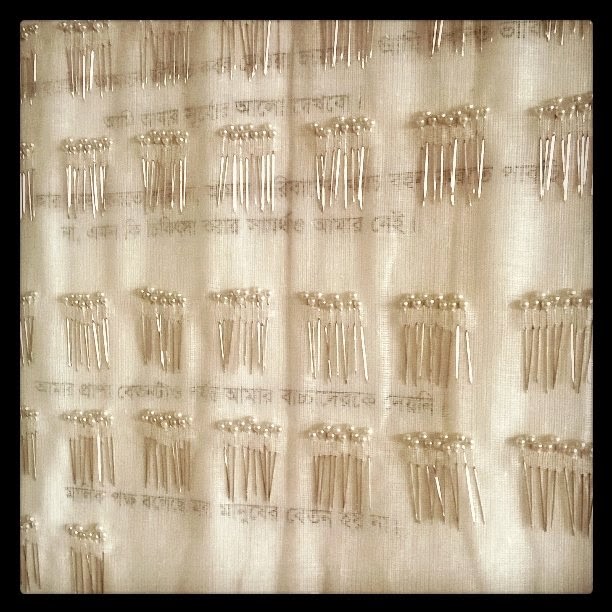Having the newest fashions on our back counts little especially if that pretty little dress is tainted with metaphorical blood -or in this case not so metaphorical.
Over 1000 people -many women and children- died in Rana Plaza in April 2013 yet most are still waiting for any form of justice or compensation.
 |
| 1,138 pins... one for each life lost in Rana Plaza. 1,138 and counting @AlkeSchmidt |
Poignant and beautiful her works are a reflection of her concern and care with the issue of sustainable fashion and our collective responsibilities rather then offering us a definite political statement.
Her exhibition of paintings, mixed media pieces and some collaborative works with local students and the artist Della Rees at the William Morris gallery felt like a natural extension to Mr. Morris' philosophies and politics but on a global stage. The often violent and brutal complexities of the textile industry, particularly the cotton trade, is highlighted through stitched, painted and printed work expanding through the decades up to the present day.
I think had he been around now that he would definitely be standing alongside Alke fighting the injustices experienced by workers in the garment trade!
 |
| Deeds not words ©AlkeSchmidt reminiscent of Morris's political banners... |
Unfortunately the exhibition Tangled Yarns ends this Sunday the 1st of February but if you can go before then I urge you to go and have a look for yourself!
Alke's work left me inspired, moved and able to ask questions and demand change... though it's not an unfamiliar subject to me because the whole concept of Craft Guerrilla was born as a response to the unfair and immoral way workers in sweat shops are undervalued and exploited in the name of affordable fashion and consumerism.
Yet almost 10 years on these injustices still continue!
Sadly the term sweat shop has its roots further back in history as the term is a deviation from "sweater shop" used in New York city back in the 1800s for garment workers who toiled in cramped, unsafe conditions at the hands of uncaring employers literally sweating due to those conditions.
 |
| Calico madames ©AlkeSchmidt. The juxtaposition of the beauty of the cotton frocks and the horror of slave labour (cotton fields) in American history. |
It's sad that the term still exists at all but it shows how little has changed.
Sure, slowly things are improving but is it enough to expect the High Street to carry all the responsibility?
 |
| "Child's Play" ©AlkeSchmidt The cotton trade and the uncomfortable truth in child labour. |
Personally I think it also falls on to us and though I don't agree that boycotting is the answer - offering the prospect of unemployment to these workers is hardly the answer either! - I do think we need to demand clothing companies to investigate and invest in the whole process from field to factory to shop floor.
 | |||||||||
| End of Empire ©AlkeSchmidt In 1931 Mahatma Gandhi visited cotton mill workers in Lancashire. Though he asked for a boycott of English cotton in India he still received a remarkable welcome. |
So what can you do?
- Write a letter to those High Street clothing companies and show your support for those workers and also to them and how you'd like to see a positive change in the way they do business.
- Recycle, up-cycle and mend your garments plus make a conscientious effort to buy less cheap clothing and instead save up for quality items which you know will last! Also make a point to seek out a company's ethical credentials... after all it's your money so you should. It's your right!
- Take it to social media! Apply pressure to companies you know are exploiting workers or working with factories that are and ask them to take action. After Rana Plaza Matalan believed they had no responsibility to the workers yet through twitter campaigning they did step up and provided a compensation package.
- Ask questions! Empower yourself with the knowledge that you are making a difference by asking the right questions (How can you afford to sell such cheap clothing? for example), it might not be necessarily a comfortable subject to think/talk about but the right questions can promote thought, discussion and ultimately a change.
“There are no foolish questions and no man becomes a fool until he has stopped asking questions.” Charles Proteus Steinmetz
Here's a short film interview of Alke by documentary filmmaker Leah Borromeo.
I hope you'll agree in saying that she is an amazing woman and artist...
We salute you Alke!!!
If you'd like to know more about the artist please visit:
https://www.a-n.co.uk/blogs/tangled-yarns
